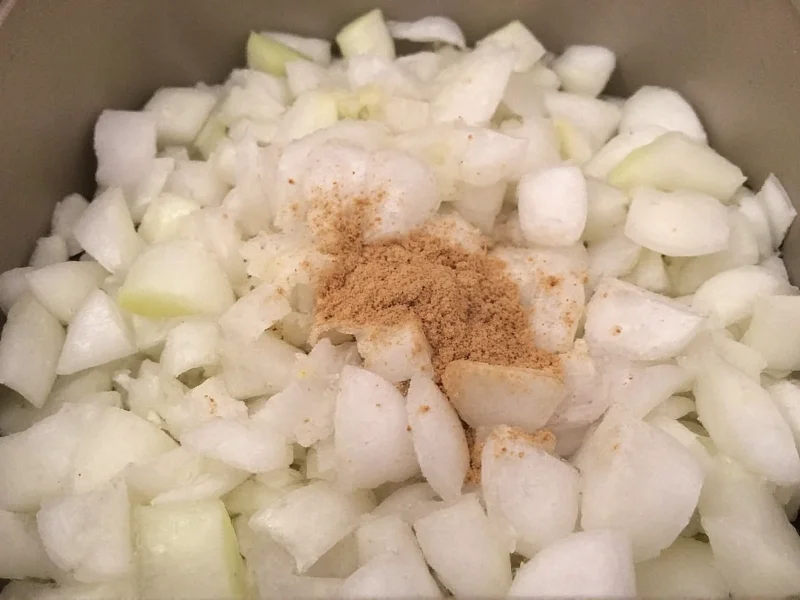Converting fresh ingredients to their dried counterparts is a common kitchen challenge, especially when recipes call for specific forms of aromatics. Understanding the precise chopped onion to onion powder conversion ensures your dishes maintain proper flavor balance and texture. This guide provides accurate measurements, scientific explanation, and practical substitution tips for home cooks and culinary professionals alike.
The Science Behind Onion Dehydration
Onions consist of approximately 89% water, 9% carbohydrates, and 2% other compounds including sugars, fiber, and volatile oils that create their distinctive flavor. When converting fresh onion to dried onion ratio, the dramatic moisture reduction concentrates flavors while eliminating the water content that affects recipe chemistry.
The dehydration process removes water molecules while preserving the onion's essential oils and flavor compounds. This concentration explains why such a large volume of fresh onions reduces to a much smaller quantity of powder. The exact ratio varies slightly based on onion variety and moisture content, but the standard 6:1 ratio provides reliable results for most culinary applications.
Precision Conversion Measurements
For accurate recipe adaptation, understanding the specific measurements between fresh and dried forms is essential. The following table provides precise conversions for common kitchen measurements:
| Chopped Fresh Onion | Equivalent Onion Powder | Liquid Adjustment Needed |
|---|---|---|
| 1 cup (160g) | 2.5-3 tablespoons (20g) | Reduce liquid by 2-3 tablespoons |
| ½ cup (80g) | 1-1.5 tablespoons (10g) | Reduce liquid by 1-1.5 tablespoons |
| ¼ cup (40g) | 2 teaspoons (5g) | Reduce liquid by 2 teaspoons |
| 1 tablespoon (13g) | ½ teaspoon (1.7g) | Reduce liquid by ½ teaspoon |
Practical Substitution Guidelines
When implementing the onion powder substitution for fresh onions in your recipes, consider these professional tips:
- Flavor intensity adjustment: Onion powder delivers more concentrated flavor than fresh onions. Start with 75% of the recommended amount, then adjust to taste.
- Liquid content modification: For every cup of fresh onions replaced, reduce other liquids in the recipe by 2-3 tablespoons to maintain proper consistency.
- Application suitability: Use powder in dry rubs, spice blends, and long-cooked dishes where fresh onion texture isn't essential. Reserve fresh onions for salads, salsas, and dishes where texture matters.
- Rehydration technique: For applications requiring fresh onion texture, mix powder with equal parts water and let sit for 15 minutes before using.
Creating Homemade Onion Powder
Commercial onion powder often contains anti-caking agents and may lack freshness. Making your own homemade onion powder from chopped onions ensures superior flavor and quality control:
- Preparation: Peel and finely chop onions, then spread in a single layer on dehydrator trays or baking sheets.
- Drying process: Dehydrate at 135°F (57°C) for 6-10 hours until completely brittle, or bake at lowest oven setting with door slightly ajar for 8-12 hours.
- Grinding: Process dried onions in a high-speed blender or spice grinder until fine powder forms.
- Storage: Keep in an airtight container away from light and moisture for up to one year.
Homemade powder typically yields slightly more volume than commercial varieties due to the absence of processing additives, so you may need to adjust the onion powder equivalent to fresh onion ratio by about 10% when using your own creation.
Common Substitution Mistakes to Avoid
Even experienced cooks make errors when converting between onion forms. Watch for these pitfalls:
- Ignoring recipe chemistry: Using the same volume of powder without adjusting liquids creates overly dry baked goods or overly thin sauces.
- Overestimating flavor strength: Onion powder's concentrated flavor can easily overwhelm a dish if substituted at a 1:1 ratio.
- Misjudging cooking time: Powder dissolves instantly while fresh onions need time to soften, affecting dish timing.
- Using old powder: Onion powder loses potency after 6 months; test freshness by rubbing between fingers and smelling.
When Fresh Onions Are Irreplaceable
While the how much onion powder equals chopped onion conversion works well for many applications, certain dishes require fresh onions for proper texture and flavor development. Reserve fresh onions for:
- Ceviches and raw preparations where texture is essential
- Quick-cooking dishes where powder would dissolve too quickly
- Recipes relying on the enzymatic reactions of fresh alliums
- Dishes where visual appeal of onion pieces matters
Understanding these distinctions ensures your culinary creations maintain their intended character while allowing flexibility with available ingredients.
How much onion powder equals 1 cup of chopped onions?
Approximately 2.5-3 tablespoons of onion powder equals 1 cup of chopped fresh onions. This conversion accounts for the 89% water content in fresh onions that evaporates during dehydration.
Can I substitute onion powder for fresh onions in all recipes?
No, substitution works best in cooked dishes like soups, stews, and sauces. Avoid substituting in raw applications like salads or salsas where texture and fresh flavor are essential. For baked goods, adjust liquid content when substituting.
Why does my dish taste too strong when I substitute onion powder?
Onion powder has concentrated flavor due to moisture removal. Start with 75% of the recommended substitution amount, then adjust to taste. Remember that 1 cup fresh onions equals only 2.5-3 tablespoons powder, not a 1:1 ratio.
How do I adjust liquid content when substituting onion powder?
For every cup of fresh onions replaced with powder, reduce other liquids in your recipe by 2-3 tablespoons. This compensates for the moisture that would have been released by fresh onions during cooking.
Does homemade onion powder differ from store-bought in conversion?
Yes, homemade powder typically has slightly higher volume due to lack of processing additives. When using homemade powder, increase the amount by about 10% compared to commercial powder for equivalent flavor strength.











 浙公网安备
33010002000092号
浙公网安备
33010002000092号 浙B2-20120091-4
浙B2-20120091-4